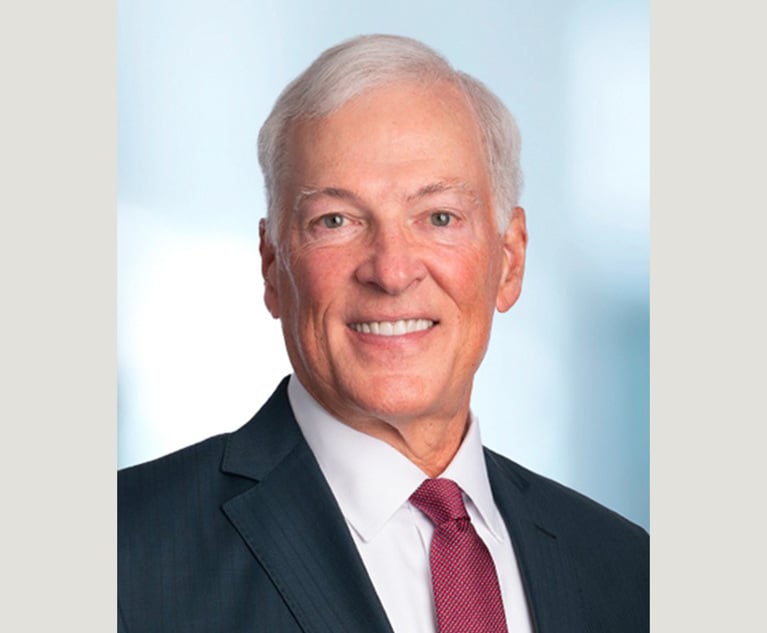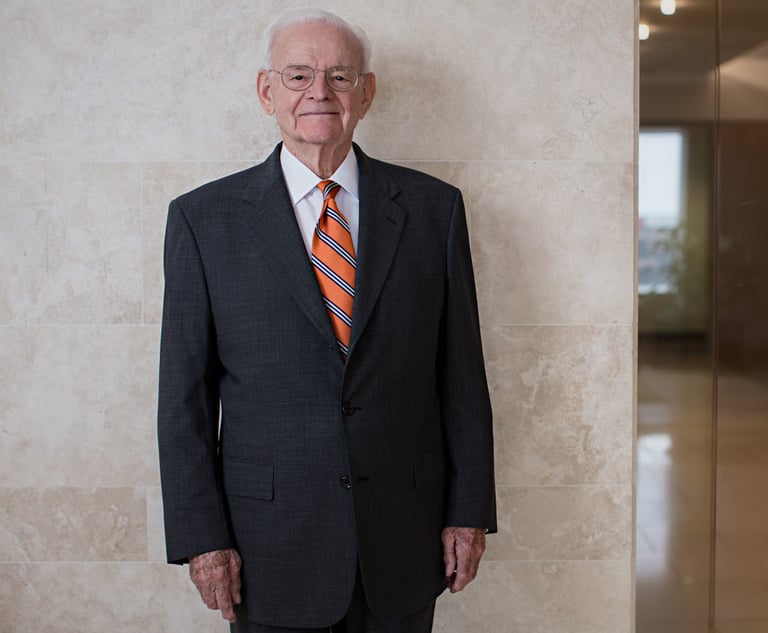 Patrick Sweeney is a judicial candidate for the Allegheny County Court of Common Pleas. Courtesy photo.
Patrick Sweeney is a judicial candidate for the Allegheny County Court of Common Pleas. Courtesy photo. Patrick Sweeney Runs for Allegheny County Court of Common Pleas
My maxim is that cases should be decided based on the facts and the law, and not based on who has access to the most resources or who benefits from systemic bias.
April 27, 2023 at 12:16 PM
5 minute read
Candidate: Patrick Sweeney
Court: Allegheny County
Party: Democrat and Republican
Allegheny County Bar Association Rating: Recommended
The following has been edited lightly for length and style.
The Legal Intelligencer: Tell us about your background, where you went to law school, what firms you have practiced at, and areas of law you focus on.
Patrick Sweeney: I am originally from and spent my early years growing up in the City of Pittsburgh. My parents were both teachers, and when my dad took a position at the Indiana University of Pennsylvania, we moved to Indiana where I graduated high school. I came back home to Pittsburgh for undergrad and law school, however. I graduated from Pitt with a B.A. in economics in 1992 and with my J.D. from Pitt Law in 1996. I've been a proud resident of the city ever since. After a brief time with a small law firm, I started to work in the Public Defender's Office of Allegheny County in 1997—where I have made my career. In the 25 years I have been a public defender, my experiences include dozens of jury trials, hundreds of non-jury trials, and I have counseled thousands of clients. I have handled every type of case from shoplifting to homicide. I have also handled cases in all four divisions of the court. In addition to my work with clients, my office has also called upon me to train and mentor new attorneys, as well as attorneys transitioning into the Trial Unit.
The Legal: What is one major thing about your career experience that most qualifies you for this position, and why?
Sweeney: My experience as a public defender. I always say that there is no better qualification for the job I am seeking than the job I have now. Being a public defender has allowed me to do and experience many things. First, it has allowed me to walk in the shoes of my clients. These are the clients who most often face institutional barriers to receiving fair and equal treatment. This first hand knowledge of where our courts fall short of the ideal of justice for all means I am well prepared to fix those shortcomings. Second, my time as a public defender also has given me the most trial experience of any of the candidates in my race. I can walk into the courtroom on day one and be prepared to start overseeing cases.
The Legal: What is the main reason Pennsylvania voters should pick you?
Sweeney: I offer voters a combination of experience and reform. I know the courts, and I know how to be a judge. As I mentioned above, I can walk into a courtroom on day one and start overseeing cases. However, my experiences mean I am also very much aware of where our court system falls short. My maxim is that cases should be decided based on the facts and the law, and not based on who has access to the most resources or who benefits from systemic bias. We have a ways to go before that maxim becomes the truth.
The Legal: What will be your approach to moving matters efficiently through the case management system?
Williams: A good judge must weigh the need to dispose of cases quickly with the needs of litigants to have enough time to adequately prepare for hearings and trials. Judges should take an active role in encouraging preparedness among the parties by scheduling status conferences and by gentle persuasion to ensure the more complex cases are not rammed through trial at too fast a pace, while also recognizing that too much delay is antithetical to the concept of justice.
The Legal: What would you say to voters regarding your plans to ensure the equal administration of justice for all people?
Sweeney: There are several things we can do. First, judges have to be conscious of the life situation that litigants are coming from. For example, some municipalities pull over Black drivers at much higher rates than one would expect by population demographics and comparisons to similar municipalities. A judge needs to be aware of that and consider how systemic bias is playing a role in who comes before the court from that municipality. It is not a crime to drive while Black.
Second, judges must ensure that justice is being given to all, this includes victims and the community at large. It is unjust if an individual with means is able to avoid accountability solely because of that access to resources. A common example of this is cash bail. If an individual poses a threat to the community, it is not just to release them based on the fact they have access to money.
Third, we must ensure the courts work in an administrative sense. Individuals can not receive justice if the courts are not working properly. A common problem these days is finding enough people willing to go through with jury duty to build a fair jury pool. Too many people looking to get out of jury duty can lead to a biased jury during trial. One way we can help address this is by paying jurors a fair wage for the labor they provide.
The Legal: Where can voters go for more information about you?
Sweeney: You can visit my website https://patricksweeneyforjudge.com. You can also find me on Facebook at https://www.facebook.com/PatrickSweeneyforJudge or on Instagram at patricksweeneyforjudge.
NOT FOR REPRINT
© 2025 ALM Global, LLC, All Rights Reserved. Request academic re-use from www.copyright.com. All other uses, submit a request to [email protected]. For more information visit Asset & Logo Licensing.
You Might Like
View All
Superior Court Directs Western Pa. Judge to Recuse From Case Over Business Ties to Defendant
3 minute read
Saxton & Stump Lands Newly Retired Ex-Chief Judge From Middle District of Pa.
3 minute read
'Discordant Dots': Why Phila. Zantac Judge Rejected Bid for His Recusal
3 minute read
Judge Louis C. Bechtle: An American Jurist Who Relied on Common Sense, Sound Judgment and Fairness
5 minute readTrending Stories
- 1Gunderson Dettmer Opens Atlanta Office With 3 Partners From Morris Manning
- 2Decision of the Day: Court Holds Accident with Post Driver Was 'Bizarre Occurrence,' Dismisses Action Brought Under Labor Law §240
- 3Judge Recommends Disbarment for Attorney Who Plotted to Hack Judge's Email, Phone
- 4Two Wilkinson Stekloff Associates Among Victims of DC Plane Crash
- 5Two More Victims Alleged in New Sean Combs Sex Trafficking Indictment
Who Got The Work
J. Brugh Lower of Gibbons has entered an appearance for industrial equipment supplier Devco Corporation in a pending trademark infringement lawsuit. The suit, accusing the defendant of selling knock-off Graco products, was filed Dec. 18 in New Jersey District Court by Rivkin Radler on behalf of Graco Inc. and Graco Minnesota. The case, assigned to U.S. District Judge Zahid N. Quraishi, is 3:24-cv-11294, Graco Inc. et al v. Devco Corporation.
Who Got The Work
Rebecca Maller-Stein and Kent A. Yalowitz of Arnold & Porter Kaye Scholer have entered their appearances for Hanaco Venture Capital and its executives, Lior Prosor and David Frankel, in a pending securities lawsuit. The action, filed on Dec. 24 in New York Southern District Court by Zell, Aron & Co. on behalf of Goldeneye Advisors, accuses the defendants of negligently and fraudulently managing the plaintiff's $1 million investment. The case, assigned to U.S. District Judge Vernon S. Broderick, is 1:24-cv-09918, Goldeneye Advisors, LLC v. Hanaco Venture Capital, Ltd. et al.
Who Got The Work
Attorneys from A&O Shearman has stepped in as defense counsel for Toronto-Dominion Bank and other defendants in a pending securities class action. The suit, filed Dec. 11 in New York Southern District Court by Bleichmar Fonti & Auld, accuses the defendants of concealing the bank's 'pervasive' deficiencies in regards to its compliance with the Bank Secrecy Act and the quality of its anti-money laundering controls. The case, assigned to U.S. District Judge Arun Subramanian, is 1:24-cv-09445, Gonzalez v. The Toronto-Dominion Bank et al.
Who Got The Work
Crown Castle International, a Pennsylvania company providing shared communications infrastructure, has turned to Luke D. Wolf of Gordon Rees Scully Mansukhani to fend off a pending breach-of-contract lawsuit. The court action, filed Nov. 25 in Michigan Eastern District Court by Hooper Hathaway PC on behalf of The Town Residences LLC, accuses Crown Castle of failing to transfer approximately $30,000 in utility payments from T-Mobile in breach of a roof-top lease and assignment agreement. The case, assigned to U.S. District Judge Susan K. Declercq, is 2:24-cv-13131, The Town Residences LLC v. T-Mobile US, Inc. et al.
Who Got The Work
Wilfred P. Coronato and Daniel M. Schwartz of McCarter & English have stepped in as defense counsel to Electrolux Home Products Inc. in a pending product liability lawsuit. The court action, filed Nov. 26 in New York Eastern District Court by Poulos Lopiccolo PC and Nagel Rice LLP on behalf of David Stern, alleges that the defendant's refrigerators’ drawers and shelving repeatedly break and fall apart within months after purchase. The case, assigned to U.S. District Judge Joan M. Azrack, is 2:24-cv-08204, Stern v. Electrolux Home Products, Inc.
Featured Firms
Law Offices of Gary Martin Hays & Associates, P.C.
(470) 294-1674
Law Offices of Mark E. Salomone
(857) 444-6468
Smith & Hassler
(713) 739-1250





